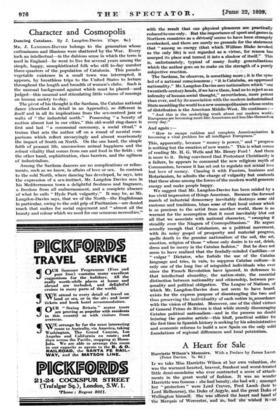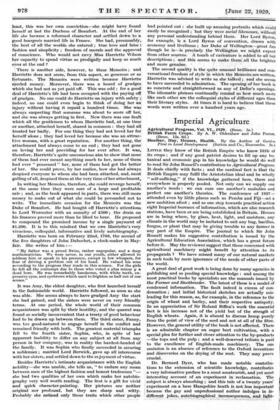A Heart for Sale
Harriette Wilson's Memoirs. With a Preface by James Laver. (Peter Davies. 7s. 6d.)
IF we take Miss Harriette Wilson at her own valuation, she was the warmest-hearted, bravest, frankest and worst-treated
little demi-mondaine who ever contracted a score of attach- ments in the great world of fashion. It was no wonder Harriette was famous : she had beauty, she had wit ; amongst her " protectors " were Lord Craven, Fred Lamb (heir to Lord Melbourne), the Duke of. Argyle, and the great Duke of Wellington himself. She was offered the heart and hand of the Marquis of Worcester, and so, had she wished it-2-ot least, this was her own conviction—she_ might have found
herself at last the Duchess of Beaufort. At the end of her life she became a reformed character and settled doWn to a good bourgeais married, life in France. She had, presumably, the best of all the worlds she entered ; true love and false ;
fashion and simplicity ; freedom of morals and the approval of conscience. Who would not envy Miss Harriette Wilson her capacity to spend virtue so prodigally and keep so much oyes at the end ?
There is another side, however, to these Memoirs ; and Harriette does not seem, from this aspect, so generous or so fortunate. The Memoirs were written because Harriette needed money. Moreover, there was a hoard of grudges which she had not as yet paid off. This was odd ; for a good' deal of Harriette's life had been occupied with the paying off of grudges. No one could do Harriette an injury with safety indeed, no one could even begin to think of doing her an injury without having it repaid a hundred times. She was always suspecting that someone was about to score off hei, and she was always getting in first. Now there was one fault; which all the gentlemen to whom Harriette had, at one time or another, attached herself, shared in common : they had all treated her badly. For one thing they had not loved her for herself alone ; they had loved her because she was an attrac- tive woman, with a great reputation. For another thing, the attachment had always come to an end ; they had not gone on loving her and providing for her ever after. It was, therefore, Harriette's quite unconscious aim to show that none: of them had ever meant anything much to her, none of them
had ever " possessed " her, none of them had got the better. of her. She could prove, by her malice, how she had always
despised everyone to whom she had been attached, and, most galling of all, despised them at the very time of her attachment, In writing her Memoirs, therefore, she could revenge herself; at the same time they were sure of a large and profitable sale ; and, as the book appeared in parts, there was still more money to make out of what she could' be persuaded not to write. The immediate occasion for the Memoirs was the Duke of Beaufort. He had bought off Harriette's attentions to Lord Worcester with an annuity of £500 ; the drain on his finances proved more than he liked to bear. He proposed to compound the promised income by a single payment of £1,200. It is to this misdeed that we owe Harriette's very vivacious, colloquial, informative and lively autobiography. Harriette was born on February 22nd, 1786, the second of the five daughters of John Dubochet, a clock-maker in May- fair. She writes of him :—
" My father was a proud Swiss, rather unpopular, and a deep mathematician. We were never, in our youth, either allowed to address him or speak in his presence, except in low whispers, for fear of driving a problem out of his head. He valued his sons according to the progress they made in this science. For the girls he felt all the contempt due to those who voted x plus minus y a dead bore. He was remarkably handsome, with white teeth, ex- pressive eyes, and eyebrows which used to frighten us half out of our senses."
It was Amy, the eldest daughter, who first launched herself in the fashionable world. Harriette followed, as soon as she was able. She seems always to have grudged Amy the start she had gained, and the sisters were never on very friendly terms. At one period, the whole world of their common acquaintance was split by their hostility, and the quarrel was found so socially inconvenient that a treaty of good behaviour bad to be drawn up between them. The third sister, Fanny, was too good-natured to engage herself in the conflict and remained friendly with both. The greatest material triumphs
fell to the fourth sister, Sophia, who, in spite of her apparent inability to differ on any subject at all from any person in her company, was in reality the hardest-headed of the family. It was Sophia who finally succeeded in securing a nobleman ; married Lord Berwick, gave up all intercourse
with her sisters, and settled down to the enjoyment of virtue. Besides Harriette's intimate acquaintance with the English nobility—she was unable, she tells us, " to endure any mean between men of the highest fashion and honest tradesmen "- she had two qualities of her own which make her autobio- 'graphy very well worth reading The first is a gift for vivid and quick character-painting. Her pictures are neither original nor profound, but they are sharp and witty. Probably she noticed only those traits which other people had pointed out : she built up 'amusing portraits which could easily be recognized ; but they were social likenesses, withotit any personal understanding behind them. Her Lord Byron, for example, is a Lord Byron of convention, drawn with economy and liveliness ; her Duke of Wellington—great fun though he is—is precisely the Wellington we might expect from other sources. A touch of caricature is added to all her descriptions ; and this seems to make them all the brighter and more genuine. - .
The second quality is the quite unusual brilliance and con- versational freedom of style in which the Memoirs are written. Harriette was advised to write as she talked ; and she seems to have succeeded to admiration. The opening of her book is as concrete and straightforward as any of Defoe's openings. The idiomatic phrases continually remind us how much more like each other are the colloquial styles of different ages than their literary styles. At times it is hard to believe that these words were written over a hundred years ago.













































 Previous page
Previous page